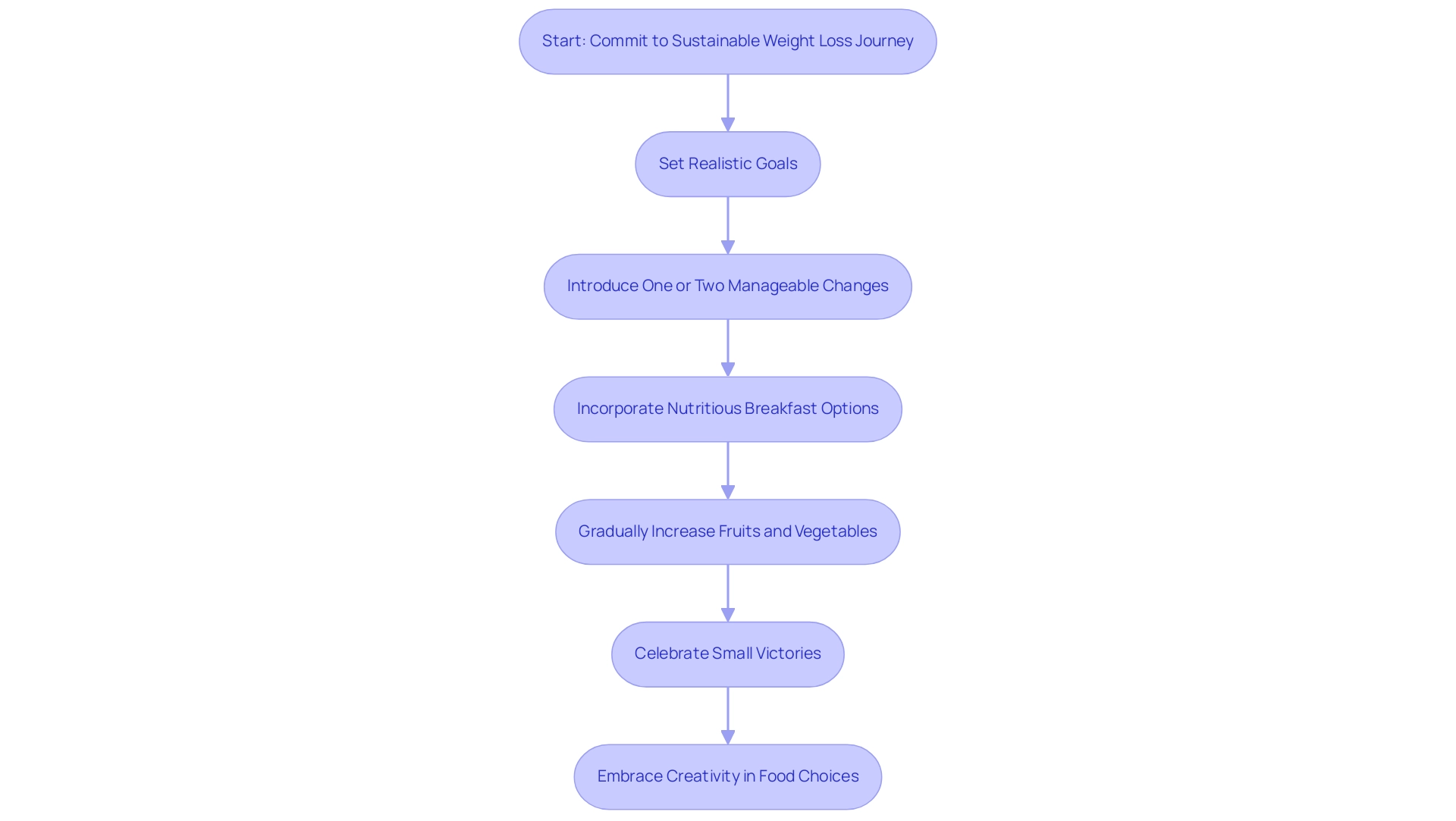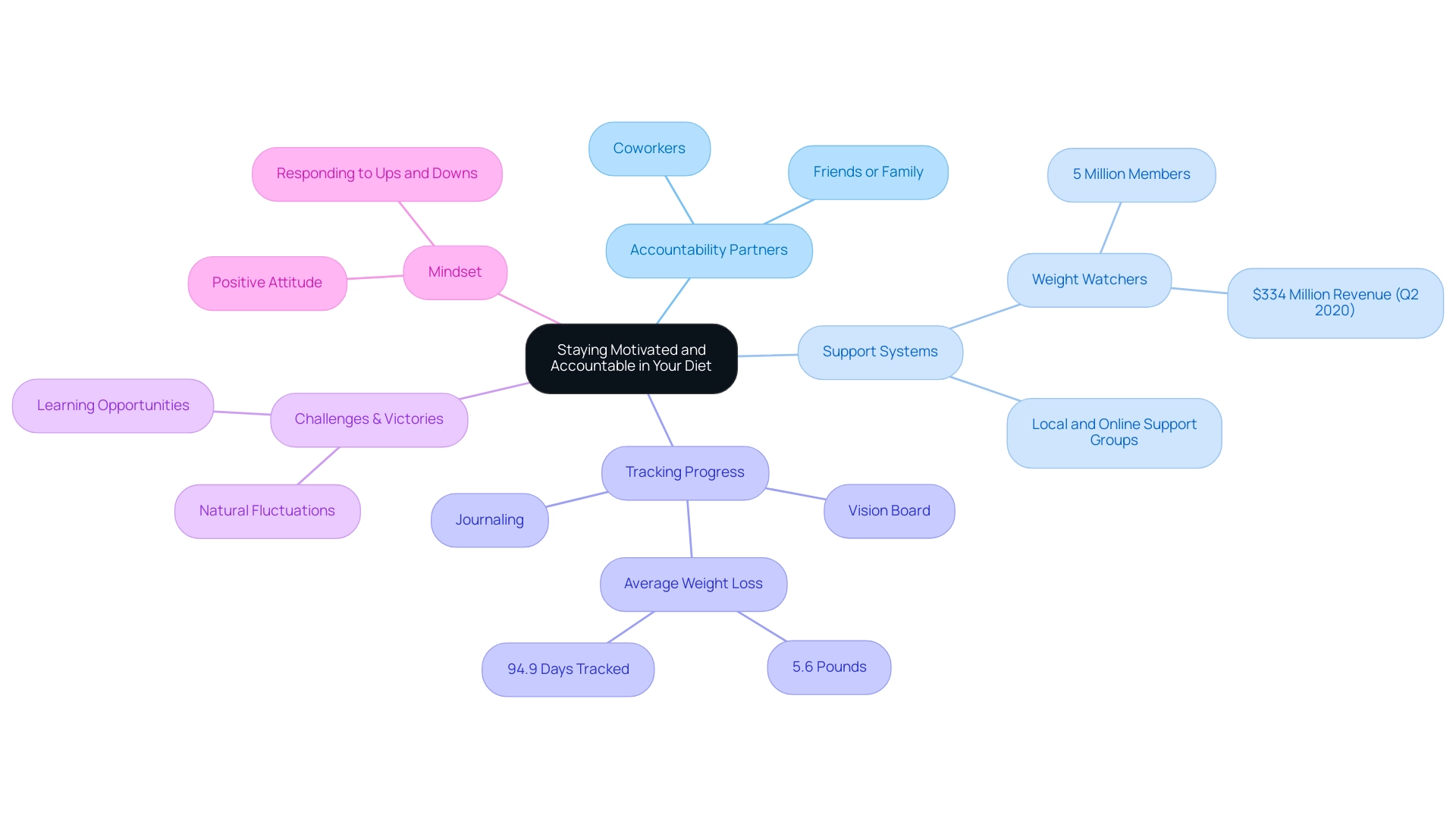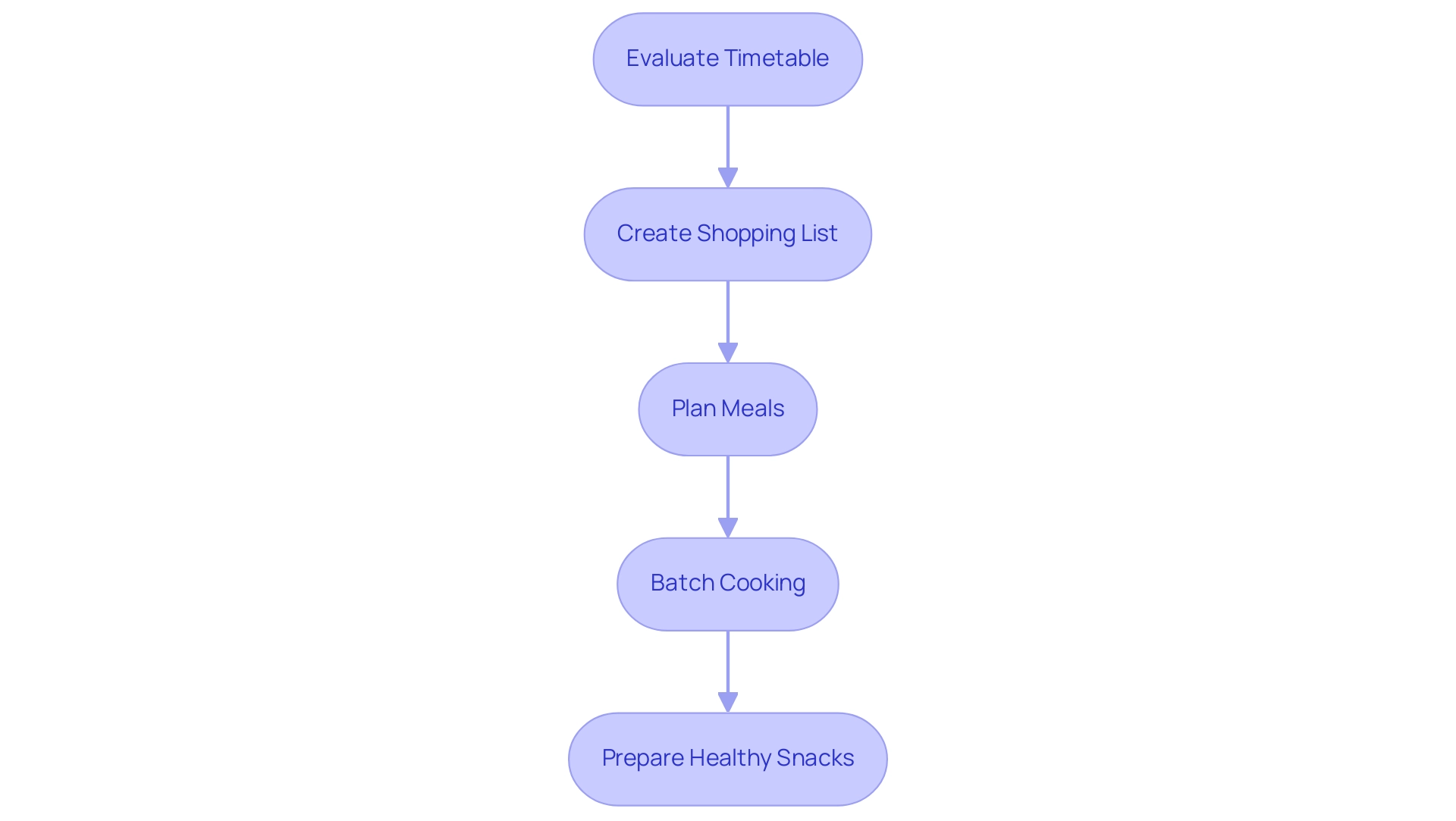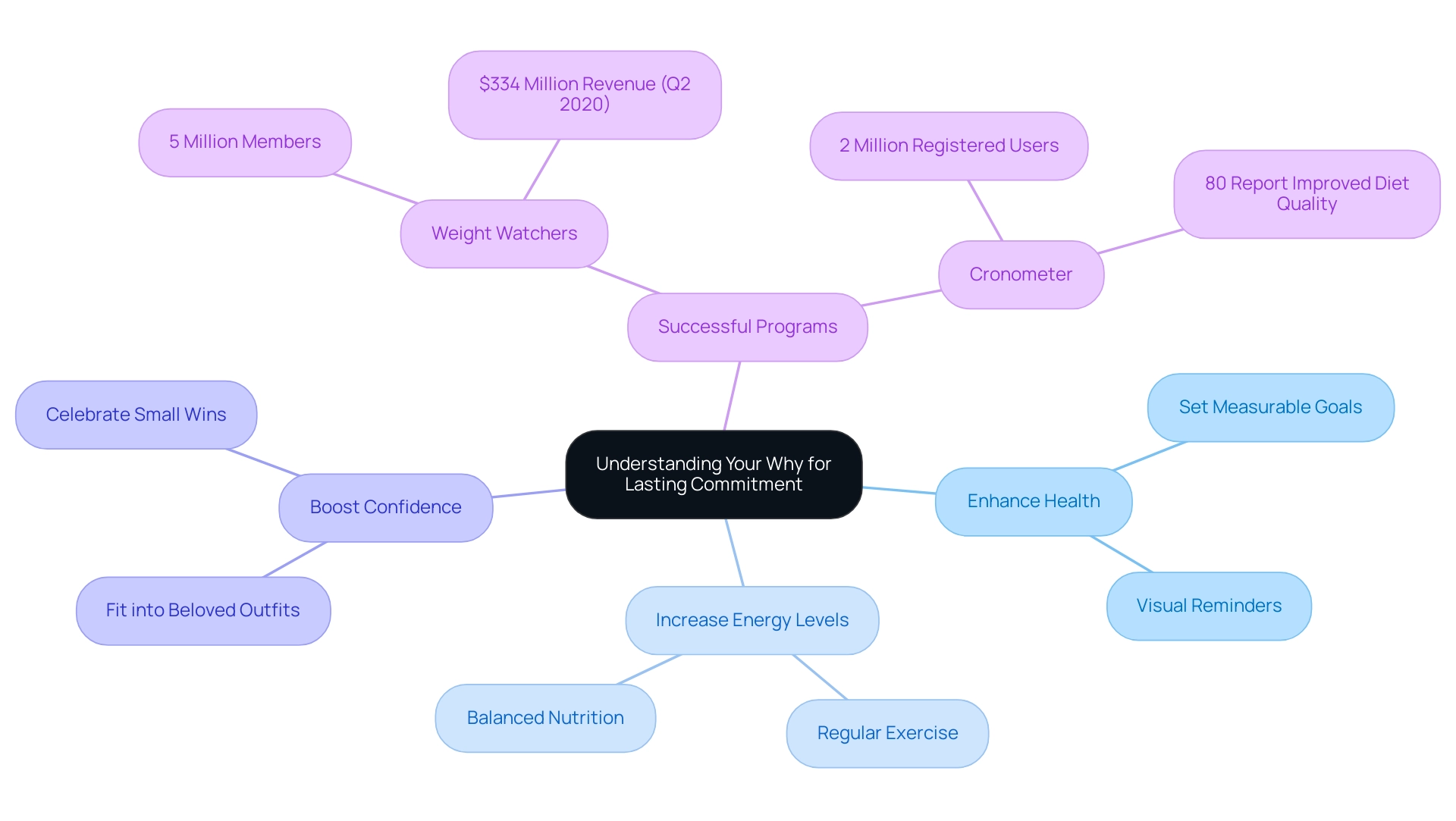Introduction
In the quest for sustainable weight loss, understanding one's dietary habits is paramount. With the modern lifestyle often leading to hasty meal choices and reliance on food delivery, tracking what is consumed can illuminate patterns that may hinder progress.
This article delves into practical strategies for meal tracking, building healthy habits, and fostering accountability, all while emphasizing the importance of planning and understanding personal motivations.
By taking actionable steps toward mindful eating and creating a supportive environment, individuals can transform their relationship with food and pave the way for lasting health and well-being.
Each small change contributes to a larger journey, reminding us that progress is achievable and every effort counts.
The Importance of Tracking Your Meals
Starting a sustainable weight loss journey involves understanding how to commit to a diet by selecting a tracking method that aligns with your lifestyle. Whether it’s a user-friendly mobile application like the one provided by Foresight Health Coaching, a traditional food diary, or an organized spreadsheet, the key is to track everything you consume—portion sizes, dining times, and the context in which you eat. Recent studies reveal that 9.3% of individuals have relied on food delivery services multiple times a month, highlighting the necessity of understanding our eating patterns in today’s fast-paced environment.
As James Cascone, Partner at Deloitte Sustainability, emphasizes, 'Averting a crisis requires a proactive approach to food awareness and the future role of food.' By diligently tracking your meals for at least a week, you can uncover insights into your eating habits and identify triggers that may lead to unhealthy choices. This practice is not about placing blame; it’s about fostering awareness and empowering yourself to make informed decisions.
Nutrition experts advocate for the use of food diaries as a powerful tool for enhancing dietary habits, illustrating how to commit to a diet starts with awareness as the first step toward meaningful change. Foresight's wellness coaching app further supports this journey by offering personalized workouts, nutrition guidance, and daily programming to help you achieve your wellness goals efficiently. The app features daily programming to keep you on track, video demonstrations for visual learners, and movement flows to maintain your physical activity.
Additionally, our corporate memberships include in-person wellness talks, comprehensive pantry services, and tailored nutrition plans, ensuring a holistic approach to workplace wellness. The wellness market is experiencing strategic acquisitions, indicating a growing interest in digital wellness solutions that support meal tracking. Many diet and nutrition apps now integrate seamlessly with popular fitness platforms like Fitbit, Apple Health, and Google Fit, making it easier than ever to track your food intake.
Remember, this journey is about progress, not perfection, and every small step can lead to significant transformations in your health and well-being.
![]()
Building Sustainable Dietary Habits
Embarking on a sustainable weight loss journey begins with understanding how to commit to a diet and setting realistic goals. Instead of overhauling your entire diet overnight, concentrate on implementing one or two manageable changes at a time. For example, if breakfast is often skipped, introduce a nutritious option such as oatmeal or a smoothie to kickstart your day.
Additionally, consider gradually increasing your intake of fruits and vegetables by incorporating them into meals you already love. The key is to cultivate habits that feel organic and enjoyable, as this is essential for learning how to commit to a diet without feeling overwhelmed. Recognizing and celebrating small victories along the way is essential for learning how to commit to a diet, as it reinforces your commitment and significantly boosts your confidence.
In fact, research indicates that 37% of respondents view chefs' creativity and recipe originality as key factors for sustainable eating, emphasizing the significance of innovative methods for food changes. As Sophie Bellon, Chairwoman of the Board of Directors and Chief Executive Officer of Sodexo, noted, embracing creativity in our food choices can lead to more sustainable habits. Furthermore, case studies like Sodexo's 'Digital Solutions for Sustainable Food Choices' illustrate how digital tools, such as the Everyday app, can inform consumers about the environmental impact of their food choices and guide them towards more sustainable options.
This approach aligns with recent research indicating how to commit to a diet by making gradual nutritional changes that lead to more sustainable habits over time, enhancing overall well-being and health outcomes.

Staying Motivated and Accountable in Your Diet
Identifying an accountability partner is a crucial step in understanding how to commit to a diet and achieving your loss goals. Whether it's a friend, family member, or coworker, selecting someone with similar nutritional ambitions can create a powerful support system. Regular check-ins can teach you how to commit to a diet by allowing you to share challenges and celebrate victories.
Significantly, entities such as Weight Watchers, which has 5 million members and earned $334 million in revenue in the second quarter of 2020, illustrate the effectiveness of organized support systems in loss management. Support groups—both local and online—have proven effective in providing motivation and sharing valuable tips on how to commit to a diet, reinforcing the idea that you are not alone in this journey. Additionally, consider the statistic that among Gen X women, 40% are focused solely on dieting, highlighting a significant demographic that values accountability and motivation.
Keeping your goals at the forefront is vital; consider creating a vision board or maintaining a journal to track your progress and reflect on how to commit to a diet. It's essential to acknowledge that fluctuations are a natural part of the process. A case study analyzing loss patterns over a 49-week program revealed that consistent food trackers maintained steady reduction, while rare and inconsistent trackers struggled to keep the loss off, particularly around holiday seasons.
What matters most is how to commit to a diet by responding to these ups and downs, using them as learning opportunities to fuel your determination. Remember, with the right support and mindset, you have the power to transform your dietary habits and achieve lasting success.

The Role of Planning in Diet Success
To embark on a successful weight loss journey, it's essential to adopt a streamlined approach that prioritizes your health and well-being. Dedicate time each week to meticulously plan your food, leveraging the support of our interactive iPhone/Android app designed for stress-free management. The app includes food tracking, recipe suggestions, and automated shopping list creation, making your planning process seamless.
Start by evaluating your upcoming timetable to pinpoint opportunities for cooking and times when quick dining options are essential. Create a detailed shopping list based on your dietary plan to prevent impulsive purchases that can hinder your progress. With our expert Founding Health Coaches curating your personalized plan, batch cooking becomes a game-changer—this strategy not only saves precious time during hectic weekdays but also ensures you have healthy options readily available at your fingertips.
Having nutritious snacks on hand is vital to fend off unhealthy cravings when hunger strikes. As highlighted by market research specialist Trishita Deb, 'The appropriate planning tools enable users to take charge of their food choices.' However, it is essential to consider that about 25% of users express concerns regarding the privacy of their medical data when using these apps, which can impact their willingness to engage with meal planning tools.
Apps like Cronometer, which has over 2 million registered users and assists in nutritional choices, demonstrate that approximately 80% of users report a significant improvement in their diet quality. Securing the loyalty of Gen Z customers, who are increasingly entering adulthood and influencing the restaurant market, is crucial as they prioritize both health and privacy. By being proactive and prepared with our simplified personalized planning approach, you’ll find it far easier to understand how to commit to a diet, paving the way for a healthier lifestyle and inspiring those around you to do the same.
Recent insights into diets and nutrition trends across various countries also highlight the importance of meal planning as a strategy for success. Our services are designed to eliminate the stress of managing your wellness and fitness, allowing you to focus on the workouts and lessons without intricate planning or setup once you’re onboarded.

Understanding Your 'Why' for Lasting Commitment
Reflecting on your motivations for how to commit to a diet is crucial for long-lasting success. Whether your goal is to enhance your health, increase your energy levels, or boost your confidence, understanding how to commit to a diet is important. Take a moment to jot down your motivations and place them where you can see them daily.
This visual reminder serves as a powerful tool to understand how to commit to a diet during moments of temptation. Setting specific, measurable goals tied to these motivations can further enhance your commitment; for instance, aim to run a certain distance or fit into a beloved outfit. By aligning your nutritional changes with your core personal values, you can discover how to commit to a diet that creates a sustainable framework for adherence.
Recent studies indicate that individuals who understand how to commit to a diet based on their intrinsic motivations are more likely to uphold their nutritional commitments over time. For example, Weight Watchers, which boasts 5 million members and generated $334 million in revenue in the second quarter of 2020, exemplifies the success of structured diet programs in fostering motivation. Additionally, Cronometer, which has garnered over 2 million registered users, shows that approximately 80% of its users report an improvement in their diet quality through informed choices.
As market research and consulting expert Trishita Deb points out, understanding personal motivations is key to knowing how to commit to a diet effectively. Embrace this journey by defining your 'why,' as it will empower you to navigate challenges and celebrate successes on your path to better health. Furthermore, statistics for 2023 and 2024 show a growing trend in personalized dietary approaches, emphasizing the need to align your goals with your values for sustained commitment.

Conclusion
Embarking on a sustainable weight loss journey hinges on awareness, accountability, and planning. Tracking meals is crucial for revealing eating patterns and empowering individuals to make informed choices. Whether using an app, diary, or spreadsheet, this practice fosters a healthier relationship with food and facilitates meaningful change.
Building sustainable dietary habits starts with:
- Setting realistic goals
- Making gradual adjustments
Celebrating small victories boosts confidence and commitment, while creativity in meal options enhances enjoyment. Support from accountability partners or structured programs is vital for maintaining motivation through challenges.
Planning plays a pivotal role in dietary success. A well-structured meal plan simplifies cooking and helps avoid impulsive decisions that can derail progress. By preparing in advance and ensuring healthy options are accessible, individuals position themselves for success. Understanding personal motivations also serves as a guiding force, aiding in navigating obstacles and celebrating achievements.
In summary, the journey to sustainable weight loss is about self-discovery and transformation. Each small change contributes to a larger goal, underscoring that progress is achievable. By taking actionable steps toward mindful eating and cultivating supportive environments, individuals can promote lasting health and well-being. Prioritizing health today opens the door to lasting change tomorrow.
Frequently Asked Questions
What is the first step in starting a sustainable weight loss journey?
The first step is to understand how to commit to a diet by selecting a tracking method that aligns with your lifestyle, such as a mobile application, a food diary, or a spreadsheet.
Why is tracking food intake important for weight loss?
Tracking food intake helps uncover insights into eating habits, identifies triggers for unhealthy choices, and fosters awareness, which empowers individuals to make informed decisions about their diet.
How long should I track my meals to see meaningful insights?
It is recommended to track your meals for at least a week to gain insights into your eating patterns.
What tools can help enhance dietary habits?
Nutrition experts advocate for food diaries as a powerful tool, and apps like Foresight's wellness coaching app provide personalized workouts, nutrition guidance, and daily programming to support dietary changes.
What additional services do corporate memberships offer?
Corporate memberships include in-person wellness talks, comprehensive pantry services, and tailored nutrition plans for a holistic approach to workplace wellness.
How do modern diet and nutrition apps assist with meal tracking?
Many diet and nutrition apps integrate with popular fitness platforms like Fitbit, Apple Health, and Google Fit, making it easier to track food intake and overall wellness.
What approach should I take when making dietary changes?
Instead of overhauling your diet overnight, focus on implementing one or two manageable changes at a time, such as introducing nutritious breakfast options or increasing fruit and vegetable intake.
Why is it important to celebrate small victories in a weight loss journey?
Recognizing and celebrating small victories reinforces commitment and boosts confidence, making it easier to sustain dietary changes.
How does creativity in food choices contribute to sustainable eating?
Embracing creativity in food choices can lead to more sustainable habits, as innovative methods for food changes can enhance enjoyment and adherence to a healthier diet.
What is the overall message regarding commitment to a diet?
The journey is about progress, not perfection, and every small step can lead to significant transformations in health and well-being.




